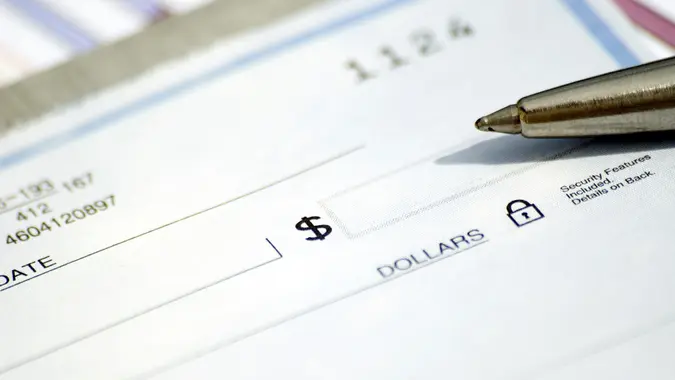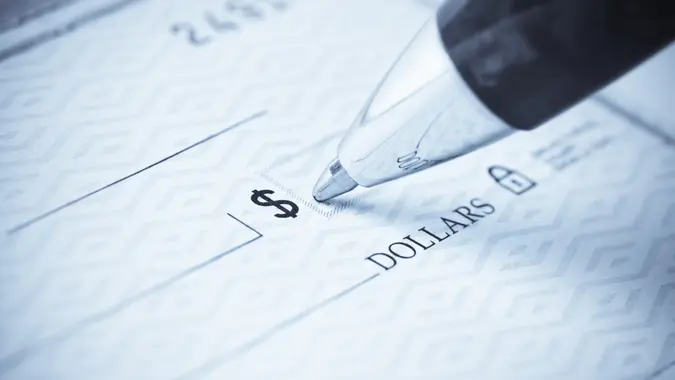How Much Money Millionaires Put in Their Checking Accounts vs. Savings

Commitment to Our Readers
GOBankingRates' editorial team is committed to bringing you unbiased reviews and information. We use data-driven methodologies to evaluate financial products and services - our reviews and ratings are not influenced by advertisers. You can read more about our editorial guidelines and our products and services review methodology.

20 Years
Helping You Live Richer

Reviewed
by Experts

Trusted by
Millions of Readers
If you’re looking to become a millionaire, or if you’re simply curious about how millionaires conduct their financial lives, you may have asked yourself, “How much money do millionaires keep in their checking accounts, and how much do they keep in their savings accounts?”
You may also be wondering what this means for you, and how you can mirror what millionaires do in these regards to best grow your own wealth?
Ultimately, it may not make a lot of sense to compare average Americans and their financial habits to millionaires and theirs — because millionaires can be all over the place with their money. Still, if you’re curious about the banking habits of the wealthy, let’s have a look.
Millionaires Don’t Keep Much in Their Traditional Savings Accounts
“My millionaire clients keep very little of their net worth in a traditional savings account. $10,000 or less,” said Herman (Tommy) Thompson, Jr., CFP, ChSNC, ChFC, a certified financial planner with Innovative Financial Group.
The key reason that millionaires tend to shy away from dumping too much cash in traditional savings accounts is because these accounts don’t pay much interest, reducing the desire to hold great wealth there.
“traditional savings accounts haven’t paid much interest in the past 20 years, so there has been no incentive to keep cash in savings other than as a safety net for the checking account,” he said.
Millionaires Like High-Yield Savings, but Not as Much as Other Accounts
Usually offering significantly more interest than a traditional savings account, high-yield savings accounts have blown up in popularity among everyone, including millionaires. Still, high net worth individuals tend to put the lion’s share of their cash elsewhere.
“High yield savings accounts have trailed CDs and government money market rates, so while I have seen some of my wealthy clients park a few hundred thousand dollars in savings, the vast majority of the cash has been going to government and treasury money market funds,” Thompson said.
Millionaires Can Be Erratic With Their Checking Accounts
What about the checking accounts of millionaires? Things can get pretty complicated and personal here.
“Millionaires’ checking accounts are all over the place,” Thompson said. “Some clients will only keep enough to pay for immediate expenses (e.g., $10,000) and others will have $150,000 in checking on any given day.”
Why do millionaires approach their checking accounts so differently and across the board?
“Because everyone thinks about money differently,” Thompson said. “We all have a different brand of mental accounting. Some people see cash in the checking account as a waste because it isn’t earning interest. Some people have no control over their spending, so the best way to keep from buying another pair of shoes they won’t wear more than twice is to make sure the money isn’t readily available in the checking account.
Millionaires Adhere to a Bank’s Fine Print — and Diversify
We all need to read the fine print that comes with our checking, savings and other bank accounts. Millionaires pay close attention to key traits here.
“Millionaires pay attention to FDIC limits and make sure they do not keep more cash in a bank than is insured,” Thompson said. “While bank defaults are incredibly rare, they’re not without precedent. Millionaires often diversify their assets and income sources. Mutual funds, stocks, ETFs, annuities, CDs, real estate and even speculative collectibles can all play a role in preserving and growing the purchasing power of hard earned dollars.”
Millionaires May Have Less Need for Liquidity
One major point to consider when thinking about how millionaires approach their banking behaviors, is that they tend to have more complex financial portfolios than the average American. They may not be as eager to tap into cash either.
“They might not rely as heavily on checking or savings accounts for their liquidity needs,” said Liam Hunt, director at Gold IRA Guide. “Instead, they may keep a smaller portion of their wealth in these accounts, as their primary focus is often on investments, business interests and other assets that offer higher returns.”
Millionaires Tend To Focus Heavily on Diversification
High net worth individuals tend to diversify investments more aggressively as a means to grow their vast wealth.
“They often prioritize investments in stocks, real estate, businesses and other vehicles that have the potential for higher returns, albeit with higher risks,” Hunt said.
Keep 2 Months’ Worth of Expenses in a Checking Account
Millionaires have much higher balances in their accounts than the average American — as they tend to have more complex and expensive needs and wants — but that doesn’t mean regular Americans should approach checking account balances too differently.
In fact, they should adhere to the same basic rules of thumb regardless of income or net worth.
“Generally I recommend keeping about one to two months’ worth of living expenses in your checking account,” said Hunt. “This amount should cover your regular monthly expenses, such as bills, groceries, and any recurring payments. The idea is to have enough to comfortably manage your day-to-day expenses while avoiding the risk of overdraft fees.”
Keep 3-6 Months’ Worth of Expenses in a Savings Account
You also shouldn’t keep more than three to six months of cash in an accessible savings account. This reserve should be used as an emergency fund.
“This fund is essentially a financial buffer against unexpected events like job loss, medical emergencies or urgent home repairs,” Hunt said.
The best place to store this savings is in a high-yield savings account, which is generally as easily accessible as a traditional savings account.
 Written by
Written by  Edited by
Edited by 

























